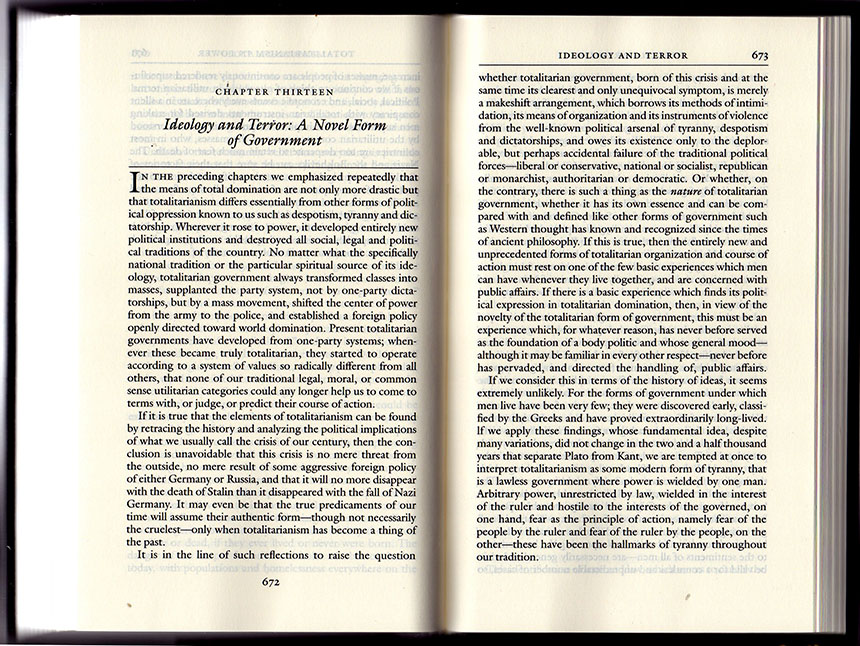
Click here for high-resolution version.
The Origins of Totalitarianism. Hannah Arendt, 1951. There is now a new edition from The Library of America, 2025, 880 pages.
As the United States spirals downward into fascism, we come across more and more references to Hannah Arendt’s classic The Origins of Totalitarianism. I decided to have a go at reading it.
It is dense reading. The book is too long for many readers (including me). I scanned quickly through parts of it in which I found (to me) excessive detail in areas with less application to the situation in which we find ourselves today. Even so, there is much to be gained in historical perspective and political philosophy.
I asked ChatGPT to write the briefest possible summary of the book, with attention to how her themes are relevant to what is happening today:
⸻
1. Antisemitism, Imperialism, and the Roots of Totalitarianism
Arendt begins by tracing antisemitism and imperialism in 19th-century Europe—not as isolated prejudices but as structural forces that eroded political equality and civic belonging. She argues that racism and economic domination abroad habituated Europeans to hierarchy and dehumanization at home.
→ Relevance: In the U.S., decades of racial hierarchy and overseas militarism have similarly normalized seeing groups of people—immigrants, minorities, political opponents—as “less real” citizens.
⸻
2. The Decline of the Nation-State and the “Right to Have Rights”
With World War I and the collapse of empires, millions became stateless refugees, losing legal protection because “the Rights of Man” depended on belonging to a political community. Arendt called this loss “the right to have rights.”
→ Relevance: When U.S. officials strip voting rights, demonize migrants, or create categories of people effectively outside the law, they reproduce this condition of rightlessness within a nominal democracy.
⸻
3. The Rise of Mass Society and the Collapse of Truth
Totalitarian movements arose not among fanatics alone but from atomized, isolated individuals who had lost trust in shared reality. The destruction of class, community, and factual discourse left people craving certainty and belonging, which demagogues supplied with ideology and conspiracy.
→ Relevance: The disintegration of civic trust, online propaganda, and “alternative facts” in today’s America are textbook examples of Arendt’s insight that loneliness and meaninglessness breed authoritarianism.
⸻
4. Ideology and the Logic of Total Domination
Totalitarian ideologies (Nazism, Stalinism) claim to explain all events through one “scientific” process—race or history—reducing individuals to functions of that logic. Once accepted, facts no longer matter; only ideological consistency does.
→ Relevance: The MAGA movement’s self-contained mythology—“the deep state,” “stolen elections,” “invasion at the border”—illustrates this same replacement of reality with narrative necessity.
⸻
5. Bureaucracy, Violence, and the Banality of Evil
Arendt’s later notion (developed from this groundwork) is that totalitarian systems rely less on monstrous villains than on ordinary people performing evil through obedience and routine.
→ Relevance: The bureaucratic enforcement of cruelty—family separations, deportations, targeted disenfranchisement—shows how moral numbness within institutions can sustain authoritarian power without overt tyranny.
⸻
6. Her Core Warning
Totalitarianism, for Arendt, is not a foreign aberration but a modern temptation: the desire to escape freedom and uncertainty through ideology, conformity, and the worship of strength. It emerges when citizens stop caring about truth, abandon solidarity, and let politics become spectacle.
→ Contemporary parallel: When a public tolerates lies, applauds humiliation, and trades citizenship for tribal identity, the preconditions of total rule are already present.
⸻
In brief:
Arendt’s central message is that freedom depends on truth, plurality, and political participation—and that when these erode under loneliness, propaganda, and cynicism, democratic societies drift toward totalitarian habits long before the camps or purges appear.
